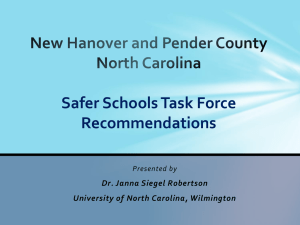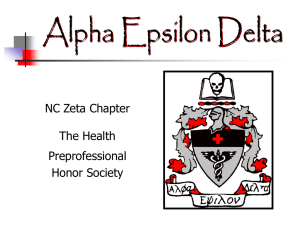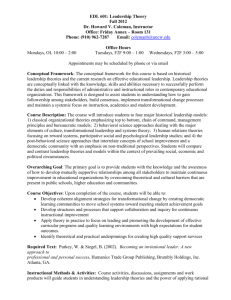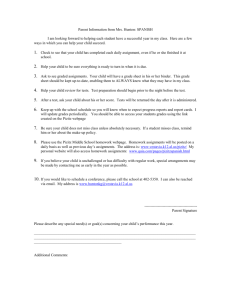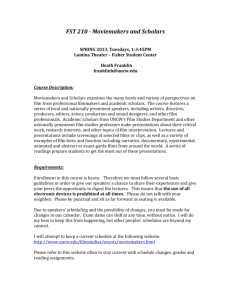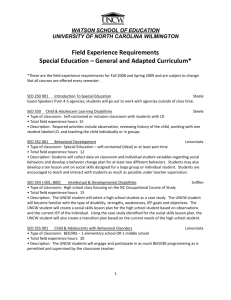SED 360: Teaching Students with Learning Problems
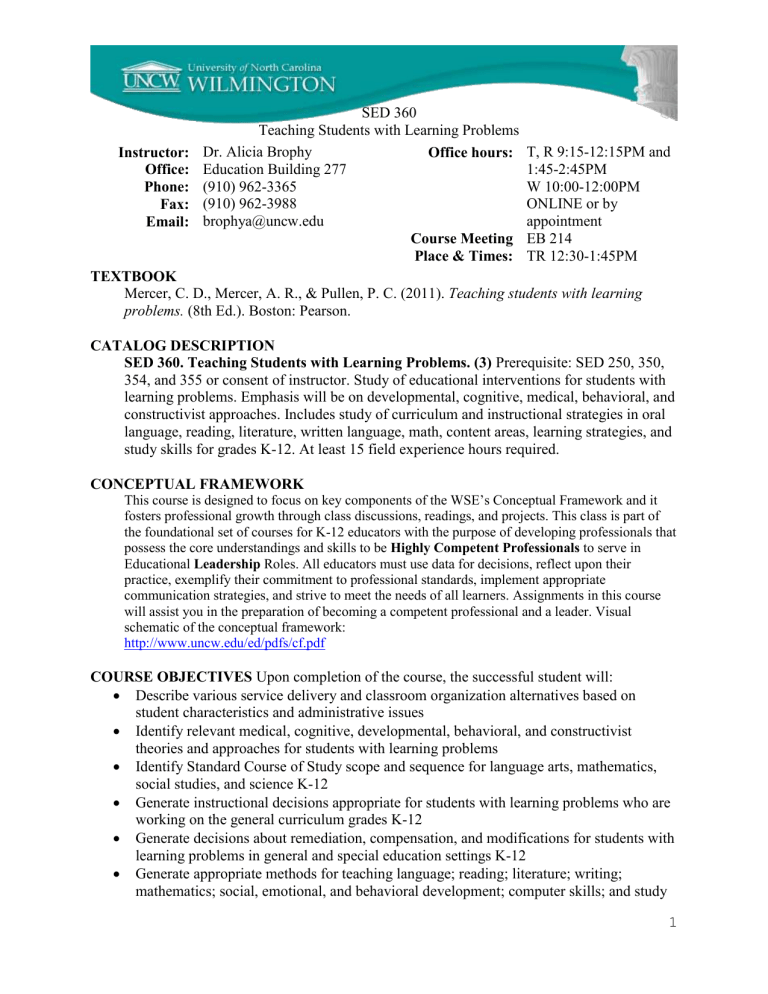
SED 360
Teaching Students with Learning Problems
Instructor: Dr. Alicia Brophy
Office: Education Building 277
Phone:
Fax:
(910) 962-3365
(910) 962-3988
Email: brophya@uncw.edu
Office hours: T, R 9:15-12:15PM and
1:45-2:45PM
W 10:00-12:00PM
ONLINE or by
appointment
Course Meeting
Place & Times:
EB 214
TR 12:30-1:45PM
TEXTBOOK
Mercer, C. D., Mercer, A. R., & Pullen, P. C. (2011). Teaching students with learning problems.
(8th Ed.). Boston: Pearson.
CATALOG DESCRIPTION
SED 360. Teaching Students with Learning Problems. (3) Prerequisite: SED 250, 350,
354, and 355 or consent of instructor. Study of educational interventions for students with learning problems. Emphasis will be on developmental, cognitive, medical, behavioral, and constructivist approaches. Includes study of curriculum and instructional strategies in oral language, reading, literature, written language, math, content areas, learning strategies, and study skills for grades K-12. At least 15 field experience hours required.
CONCEPTUAL FRAMEWORK
This course is designed to focus on key components of the WSE’s Conceptual Framework and it fosters professional growth through class discussions, readings, and projects. This class is part of the foundational set of courses for K-12 educators with the purpose of developing professionals that possess the core understandings and skills to be Highly Competent Professionals to serve in
Educational Leadership Roles. All educators must use data for decisions, reflect upon their practice, exemplify their commitment to professional standards, implement appropriate communication strategies, and strive to meet the needs of all learners. Assignments in this course will assist you in the preparation of becoming a competent professional and a leader. Visual schematic of the conceptual framework: http://www.uncw.edu/ed/pdfs/cf.pdf
COURSE OBJECTIVES Upon completion of the course, the successful student will:
Describe various service delivery and classroom organization alternatives based on student characteristics and administrative issues
Identify relevant medical, cognitive, developmental, behavioral, and constructivist theories and approaches for students with learning problems
Identify Standard Course of Study scope and sequence for language arts, mathematics, social studies, and science K-12
Generate instructional decisions appropriate for students with learning problems who are working on the general curriculum grades K-12
Generate decisions about remediation, compensation, and modifications for students with learning problems in general and special education settings K-12
Generate appropriate methods for teaching language; reading; literature; writing; mathematics; social, emotional, and behavioral development; computer skills; and study
1
SED 360
Teaching Students with Learning Problems skills, content area skills, and learning strategies to students with learning problems
Generate recommendations for family, diversity, and cultural issues
Demonstrate use of various instructional methods and materials for the general curriculum with students with learning problems
Generate lesson plans and unit plans using Standard Course of Study goals and objectives with appropriate modifications for children with learning problems
REQUIREMENTS
1.
Textbook chapter summaries prepared for class discussion by due date
2.
Class presentation of teaching strategies (to be done with a partner)
3.
Classroom Analysis based on 15 hours teaching students with learning problems in a public school setting
4.
Curriculum & Instruction project
5.
Final Exam Conference
COURSE REQUIREMENTS/GRADING
A minimum of 75% of class sessions must be attended to receive credit; however, attendance at all sessions is strongly encouraged.
A minimum of 15 field experience hours must be completed to receive course credit.
Participation in class discussions and activities is encouraged and will be graded.
Grades will be assigned as follows:
A 90-100%
B 80-89%
C 70-79%
D 60-69%
F below 60%
The curriculum & instruction project and classroom analysis grades will be based on content and technical quality with content weighted double
Chapter summaries, strategy presentation, and final exam conference are required to get credit for the course
Final grades will be determined as follows:
Midterm Exam 20%
Curriculum & instruction project 25%
Classroom analysis 40%
Participation & Discussion 10%
Chapter Summaries
Final grade
5%
100%
Important notes for all graded assignments:
There will be a 10% point deduction (of received points) for each late assignment. An
assignment is considered late if the assignment received is dated past the due date.
Assignments must be submitted by the last day of this class to receive credit.
*Please note: The syllabus is subject to change throughout the semester, which can include (but is not limited to) assignments, percentages, due dates, etc.
2
SED 360
Teaching Students with Learning Problems
COURSE EXPECTATIONS/POLICIES
My goal for this class is to provide each of you with a foundation of learning within the field of special education and to help you develop your skills as educators over the duration of this course. I strongly encourage class discussions and understand that we all may have differing opinions on the topics to be discussed. I expect for each of you to respect the ideas of others and my own, and to engage in active listening skills. If your conduct during class impairs the learning of others and is disrespectful, you will not be allowed to participate in future class sessions.
All students are expected to adhere to the Watson
School of Education Standards for Professional Conduct described at http://www.uncw.edu/ed/advising/documents/StandardsofPC.pdf
I expect that you will attend every class session. A component of your grade (10%) is contingent on class participation and discussion. If an unexpected emergency occurs, please notify me via phone or email. You may electronically submit your assignments on the date they are do if you are unable to attend class.
The use of cellular phones is not allowed while class is in session. Please turn them off or on silent prior to the start of class.
I will be sending out information to each of you through your UNCW email accounts.
Please be sure to check them on a frequent basis!
If at any time, you need additional support or seek clarification with regard to assignments or this course in general, please feel free to contact me. I will be available during my office hours; however you may also schedule an appointment with me at a different time.
TECHNOLOGY
This course is formatted as a hybrid course – meaning that information pertaining to this class will be available on-line in addition to face-to-face instruction, and some assignments will be submitted electronically. The on-line format of the course will use the system,
Blackboard Learn, which can be accessed directly through this link: https://learn.uncw.edu
or through your MySeaport link.
For problems and computer help or assistance, email TAC (TAC@uncw.edu) or contact the
UNCW ITSD Computer Help Desk at http://www.uncw.edu/itsd/tac.htm
or visit its location in the Randall Library. You may also stop by the computer lab in the Education
Building Room 111 and seek advice/assistance from the Graduate Assistant if they are readily available.
3
SED 360
Teaching Students with Learning Problems
UNIVERSITY PROCEDURES AND POLICIES
A.
Academic Integrity: Students have the responsibility to know and observe the requirements of The UNCW Student Academic Honor Code Policy 04.100
( http://uncw.edu/stuaff/odos/documents/0910CodeofStudentLife_FINAL.pdf
). This code forbids cheating , fabrication or falsification of information , multiple submissions of academic work , plagiarism , abuse of academic materials , and complicity in academic dishonesty . Any special requirements or permission regarding academic integrity in this course will be stated by the instructor, and are binding on the students.
Academic evaluations in this course include a judgment that the student’s word is free from academic dishonesty of any type; and grades in this course therefore should be and will be adversely affected by academic dishonesty.
B.
Disability Services: Students with documented disabilities who need accommodations with regard to assignments and/or exams should inform the instructor at the beginning of the semester. Information pertaining to services available to students with disabilities is located at the following website: http://uncw.edu/stuaff/disability/
C.
Diversity Commitment
“In the pursuit of excellence, UNC Wilmington actively fosters, encourages, and promotes inclusiveness, mutual respect, acceptance, and open-mindedness among students, faculty, staff, and the broader community. Diversity is an educational benefit that enhances the academic experience and fosters free exchange of ideas from multiple perspectives. Diversity includes, but is not limited to race, sex, age, color, national origin (including ethnicity), creed, religion, disability, sexual orientation, political affiliation, veteran’s status, gender, educational disadvantage, socio-economic circumstances, language, and history of overcoming adversity.
For more information concerning ways in which our multicultural learning community may be nurtured and protected or complaint resolution procedures, contact the Office of Institutional Diversity and Inclusion, the Office of the
Dean of Students or the Office of Human Resources.” (from Code of Student Life )
4
COURSE SCHEDULE
SED 360
Teaching Students with Learning Problems
Class Meetings
August 23 rd
August 28 th
August30 th
September 4 th
September 6 th
September 11 th
September 13 th
September 18 th
September 20 th
September 25 th
September 27 th
October 2 nd
October 4 th
October 9 th
October 11 th *
October 16 th
October 18 th
October 23 rd
October 25 th
October 30 th
November 1 st
November 6 th
November 8 th
November 13 th
November 15 th
November 20 th
November 22 nd
November 27 th
November 29 th
December 4 th
December 13 th
Topics
Introduction to Course
Classroom Services & Organization
Assessment & Instruction
Assessment & Instruction
Value of theories
Behavioral Models
Developmental Models
Medical Models
Cognitive Theories
Constructivist Theories
Oral Language Curriculum & Instruction
Reading Curriculum & Instruction
Reading Curriculum & Instruction
NO CLASS (Fall Break)
Reading Curriculum & Instruction
Literature
Writing Curriculum & Instruction
Writing Curriculum & Instruction
Mathematics Curriculum & Instruction
Mathematics Curriculum & Instruction
Science Curriculum & Instruction
Science Curriculum & Instruction
Social Studies Curriculum & Instruction
Social Studies Curriculum & Instruction
Content Instruction & Study Skills
NO CLASS (Thanksgiving Holiday)
Learning Strategies
Social, Emotional, & Behavioral Skills
Social, Emotional, & Behavioral Skills
Final Exam (11:30 a.m. – 2:30 p.m.)
* Last day to withdraw with a W in the course
Assignments and Exams
Summaries 1,2
Summaries 3,4
Summary 6
Oral Language Curriculum & Instruction Summaries 7 & 8
Summaries 9 & 10
Summaries 11 & 12
Summaries 13 & 14
Summary 5
Classroom Analysis Due!!
C & I Project Due!!!
Conferences
5

